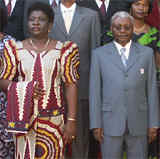
Mozambique Prime Minister Luisa Dias Diogo and President Amando Guebuza
Originally uploaded by Pan-African News Wire Photo File
MINISTERS for gender and women’s affairs from southern Africa have endorsed the contents of a Gender Protocol that would make regional decisions on gender equality legally binding for the first time.
The protocol contains several measures to address the attainment of commitments to gender equality, justice and women’s empowerment in the Southern African Development Community.
The measures include specific goals and targets to ensure accountability in addressing inequalities in constitutional and legal rights; governance; education and training; productive resources and employment; gender-based violence; health; HIV and Aids; peace building and conflict resolution; and in the media, information and communication.
The protocol will be submitted to Sadc Ministers of Justice for their perusal ahead of the Sadc Summit of Heads of State and Government in Lusaka in August.
Gender ministers from the 14 Sadc member states met in the Mozambican capital, Maputo, where the President assured them that Mozambique would continue working towards the implementation of the Protocol.
The opening address by President Armando Guebuza set the tone for their deliberations when he said that the new Sadc protocol on gender would contribute to the "deepening of the regional integration process, sustainable development and edification of a strong, solid and inclusive community".
Guebuza highlighted the contributions made by women, starting from the struggle to free southern Africa from the yoke of foreign domination, racist regimes and apartheid.
Women had felt the brunt of torture and colonial humiliation, imprisonment, forced labour and exile, but had not given up, he said.
"Thanks to these women and the role they played for our liberation, what yesterday seemed a mirage is today a reality," he added, saying that "we are proud of these achievements and they inspire us for the battles of the present and the future."
Today’s battle includes the struggle against hunger, poverty and endemic diseases, as well as regional integration, Guebuza said. This means that there is a significant role for women to play so "that we can emerge victorious from these new challenges."
He recalled that women’s participation had been prioritised by Sadc leading to the adoption in 1997 of the Sadc Declaration on Gender and Development by the Heads of State and Government, "with women not only taking an active part in its drafting, but also, importantly, giving signs that the document would afford them new opportunities for greater participation in the regional and national challenges of the moment."
At least three countries in Sadc attained the 30 percent target for women participation in decision-making structures by the year 2005 as specified in the 1997 of the Sadc Declaration on Gender and Development.
A decade later, the moment has arrived for Sadc to take the "next qualitative step, moving to a Protocol, a binding regional instrument."
The Sadc Executive Secretary, Tomaz Salomão, told the gathering that the process had gained momentum and registered phenomenal progress, starting from the decision in 2005 of the Council of Ministers for the drafting of a Protocol on Gender and Development.
Sadc member states have a shared vision for the creation of a future where the regional community has enduring peace, freedom, social justice, equitable development and a prosperous sustainable economy for the peoples of southern Africa, with the "resolution of the priority needs for the reduction of poverty and socio-economic imbalances".
Heads of State and Government approved the gender declaration in 1997, and its addenda on the Prevention and Eradication of Violence against Women and Children in 1998, in the knowledge that poverty reduction and human rights are inextricably linked to achieving gender equality, Salomão said.
Although there has been significant progress towards achieving gender equality, there were still shortcomings, Salomão said, adding that "implementation of gender commitments still falls short of stated commitments as glaring gaps and obstacles still prevail that prevent gender equality from being a reality."
He said the development of a Protocol on Gender and Development was a practical example showing that Sadc is prepared to transform its commitments into action for achieving gender equality and equity. —
http://www.Sardc.net
No comments:
Post a Comment